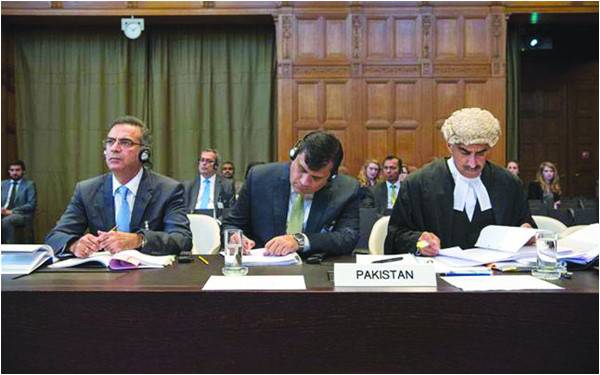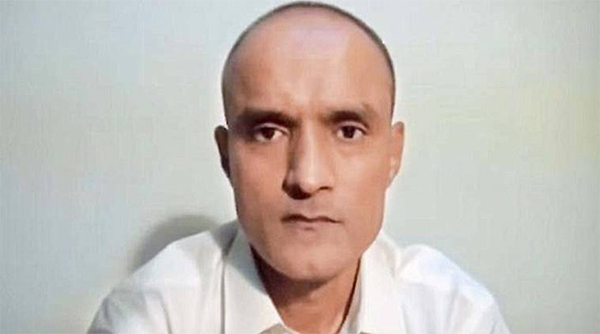
Pakistan has made India a major concession by offering a meeting between Indian spy Commander Kulbhushan Jadhav, who has been sentenced to death on charges of espionage and terrorism, and his wife and is expected to make further concessions before submitting its counter-arguments in his case at the International Court of Justice (ICJ).
The Pakistani offer took the Indian government by surprise and it then spent a whole week calculating its next move. After extensive deliberations, Delhi decided to welcome the offer and ask Pakistan to reconsider its earlier requests for his mother’s visit and consular access that were either declined or not responded to.
The details of what India has asked for before it finally accepts the offer for a meeting between Jadhav and his wife are not publicly known, but informed sources tell TFT that it also wants Jadhav’s mother, a counselor from the Indian High Commission in Islamabad and his lawyer to meet him.
Foreign Office Spokesman Dr Muhammad Faisal says the Indian reply is “being considered”.
Insiders say the request for Jadhav’s mother to meet him is likely to be accepted, but internal discussions continue over whether or not to allow the Indian counselor and Jadhav’s lawyer. Allowing an official of the Indian High Commission and Jadhav’s lawyer to see him essentially constitutes consular access that Pakistan has so far been denying and is what had prompted India to approach the International Court of Justice in May.
India had sought the ICJ’s intervention on the grounds that Pakistan had “violated” Article 36 of the Vienna Convention on Consular Relations (VCCR) by denying it consular access to Jadhav.
The case is still being heard by the ICJ, which had, after preliminary oral arguments, restrained Pakistan from executing Jadhav till the pronouncement of the verdict.
Pakistan has rejected Indian requests for consular access to Jadhav on at least on six occasions.

Islamabad’s change of heart has come as the clock is ticking on the deadline for the submission of counter-arguments called the counter-memorial, on December 13. In September, India had, in its written submissions, accused Islamabad of an “egregious violation of the Vienna Convention on Consular Relations 1963 by Pakistan”. It is believed that by offering a meeting between Jadhav and his wife and possibly with his mother, Islamabad is seeking to strengthen its reply. Pakistan’s official position has been that the offer has been made on “humanitarian grounds” and in accordance with “Islamic traditions and jurisprudence”.
After receiving Pakistan’s arguments, the court may take several months to a year to announce its verdict. It is difficult to predict how the case proceeds at the ICJ, but India has, through the re-election of Justice Dalveer Bhandari as a judge at ICJ, received a major boost in morale. An article in ‘The Hindu’ on Justice Bhandari’s re-election said: “The import of India’s efforts at securing a place at the high table of global jurisprudence should be seen in the backdrop of the Kulbhushan Jadhav case, which is currently pending before the court.”
March 3, 2016: Jadhav is arrested by security agencies in Balochistan for illegally crossing into Pakistan from Iran.
March 29, 2016: ISPR releases Jadhav’s video confessional statement.
Sept 21, 2016 and Feb 12, 2017: Court martial proceedings by the Field General Court Martial held.
April 10, 2017: Army Chief Gen Qamar Bajwa ratifies death sentence for Jadhav by the Field General Court Martial.
May 8, 2017: India approaches ICJ, seeking proceedings against Pakistan for denying consular access to Jadhav.
May 15, 2017: ICJ hears oral arguments by India and Pakistan on an Indian request for the indication of provisional measures.
May 18, 2017: ICJ asks Pakistan to take all measures to prevent the execution of Jadhav, pending final judgment of the Court.
June 13, 2017: ICJ fixes time limits for the filing of the memorial and counter-memorial by India and Pakistan.
June 22, 2017: ISPR announces the rejection of Jadhav’s appeal and submission of mercy petition.
Sept 13, 2017: India submits its memorial at the ICJ.
Nov 10, 2017: Pakistan offers a meeting between Jadhav and his wife.
Nov 18, 2017: FO announces the receipt of Indian response to the meeting offer.
Commander Jadhav, a serving Indian Naval officer, who has been on secondment with Indian intelligence agency R&AW, was caught by Pakistani security forces in Balochistan in March last year. He later confessed to his involvement in espionage and terrorist activities and was sentenced to death after a trial by a military court. Jadhav’s appeal has been rejected by an appellate military court. His mercy petition is pending with Army Chief Gen Qamar Bajwa.
While speaking at a seminar in Islamabad, Chairman Joint Chiefs of Staff Committee Gen Zubair Hayat underscored the importance of the Jadhav case for Pakistan while saying: “The apprehension of an Indian spy and terror don of its intelligence agency R&AW from Balochistan is the proverbial smoking gun of their (Indian) involvement” in subversive activities in Pakistan.
The writer is a freelance journalist based in Islamabad and can be reached at mamoonarubab@gmail.com and @bokhari_mr
The Pakistani offer took the Indian government by surprise and it then spent a whole week calculating its next move. After extensive deliberations, Delhi decided to welcome the offer and ask Pakistan to reconsider its earlier requests for his mother’s visit and consular access that were either declined or not responded to.
The details of what India has asked for before it finally accepts the offer for a meeting between Jadhav and his wife are not publicly known, but informed sources tell TFT that it also wants Jadhav’s mother, a counselor from the Indian High Commission in Islamabad and his lawyer to meet him.
Pakistan surprises India by offering Jadhav meeting with wife. Internal discussions continue over whether or not to allow the Indian counselor and Jadhav's lawyer as requested by India
Foreign Office Spokesman Dr Muhammad Faisal says the Indian reply is “being considered”.
Insiders say the request for Jadhav’s mother to meet him is likely to be accepted, but internal discussions continue over whether or not to allow the Indian counselor and Jadhav’s lawyer. Allowing an official of the Indian High Commission and Jadhav’s lawyer to see him essentially constitutes consular access that Pakistan has so far been denying and is what had prompted India to approach the International Court of Justice in May.
India had sought the ICJ’s intervention on the grounds that Pakistan had “violated” Article 36 of the Vienna Convention on Consular Relations (VCCR) by denying it consular access to Jadhav.
The case is still being heard by the ICJ, which had, after preliminary oral arguments, restrained Pakistan from executing Jadhav till the pronouncement of the verdict.
Pakistan has rejected Indian requests for consular access to Jadhav on at least on six occasions.

Islamabad’s change of heart has come as the clock is ticking on the deadline for the submission of counter-arguments called the counter-memorial, on December 13. In September, India had, in its written submissions, accused Islamabad of an “egregious violation of the Vienna Convention on Consular Relations 1963 by Pakistan”. It is believed that by offering a meeting between Jadhav and his wife and possibly with his mother, Islamabad is seeking to strengthen its reply. Pakistan’s official position has been that the offer has been made on “humanitarian grounds” and in accordance with “Islamic traditions and jurisprudence”.
After receiving Pakistan’s arguments, the court may take several months to a year to announce its verdict. It is difficult to predict how the case proceeds at the ICJ, but India has, through the re-election of Justice Dalveer Bhandari as a judge at ICJ, received a major boost in morale. An article in ‘The Hindu’ on Justice Bhandari’s re-election said: “The import of India’s efforts at securing a place at the high table of global jurisprudence should be seen in the backdrop of the Kulbhushan Jadhav case, which is currently pending before the court.”
Timeline of Kulbhushan Jadhav case
March 3, 2016: Jadhav is arrested by security agencies in Balochistan for illegally crossing into Pakistan from Iran.
March 29, 2016: ISPR releases Jadhav’s video confessional statement.
Sept 21, 2016 and Feb 12, 2017: Court martial proceedings by the Field General Court Martial held.
April 10, 2017: Army Chief Gen Qamar Bajwa ratifies death sentence for Jadhav by the Field General Court Martial.
May 8, 2017: India approaches ICJ, seeking proceedings against Pakistan for denying consular access to Jadhav.
May 15, 2017: ICJ hears oral arguments by India and Pakistan on an Indian request for the indication of provisional measures.
May 18, 2017: ICJ asks Pakistan to take all measures to prevent the execution of Jadhav, pending final judgment of the Court.
June 13, 2017: ICJ fixes time limits for the filing of the memorial and counter-memorial by India and Pakistan.
June 22, 2017: ISPR announces the rejection of Jadhav’s appeal and submission of mercy petition.
Sept 13, 2017: India submits its memorial at the ICJ.
Nov 10, 2017: Pakistan offers a meeting between Jadhav and his wife.
Nov 18, 2017: FO announces the receipt of Indian response to the meeting offer.
Commander Jadhav, a serving Indian Naval officer, who has been on secondment with Indian intelligence agency R&AW, was caught by Pakistani security forces in Balochistan in March last year. He later confessed to his involvement in espionage and terrorist activities and was sentenced to death after a trial by a military court. Jadhav’s appeal has been rejected by an appellate military court. His mercy petition is pending with Army Chief Gen Qamar Bajwa.
While speaking at a seminar in Islamabad, Chairman Joint Chiefs of Staff Committee Gen Zubair Hayat underscored the importance of the Jadhav case for Pakistan while saying: “The apprehension of an Indian spy and terror don of its intelligence agency R&AW from Balochistan is the proverbial smoking gun of their (Indian) involvement” in subversive activities in Pakistan.
The writer is a freelance journalist based in Islamabad and can be reached at mamoonarubab@gmail.com and @bokhari_mr

